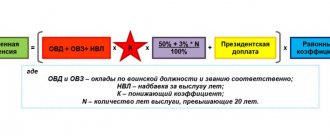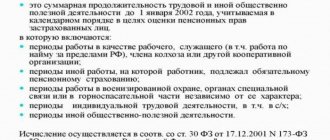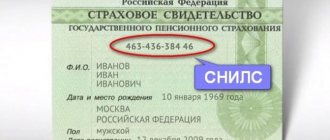According to the court's decision, I must reimburse part of the legal costs. A writ of execution was issued against me. My only source of income is a pension with a regional supplement. Submitted an application for installment plan. The court decided that the monthly payment should be 80% of my pension. Is this legal?
According to clause 9, part 1, art. 101 of the Federal Law of October 2, 2007 No. 229-FZ (as amended on July 26, 2017) “On Enforcement Proceedings” (hereinafter referred to as the Law on Enforcement Proceedings), collection cannot be applied to insurance coverage for compulsory social insurance, with the exception of old age insurance pension, disability insurance pension (taking into account a fixed payment to the insurance pension, increases in the fixed payment to the insurance pension), as well as funded pension, fixed-term pension payment and temporary disability benefits.
Thus, the legislator excluded old-age pension from income, which cannot be recovered.
According to Art. 37 of the Law on Enforcement Proceedings, a claimant, debtor, bailiff has the right to apply for a deferment or installment plan for the execution of a judicial act, an act of another body or official, as well as to change the method and procedure for its execution to a court, another body or an official the person who issued the executive document. If the debtor is granted a deferment in the execution of a judicial act, an act of another body or official, enforcement actions are not performed and enforcement measures are not applied within the period established by the court, other body or official that granted the deferment. If the debtor is granted an installment plan for the execution of a judicial act, an act of another body or official, the executive document is executed in that part and within the time limits established in the act on granting the installment plan.
Legal proceedings related to the provision of installment plans are regulated by the Civil Procedure Code of the Russian Federation.
According to Art. 203 of the Code of Civil Procedure of the Russian Federation, the court that examined the case, upon applications of the persons participating in the case, the bailiff, or based on the property status of the parties or other circumstances, has the right to postpone or defer the execution of the court decision, change the method and procedure for its execution. These applications are considered in court. Persons participating in the case are notified of the time and place of the court hearing, but their failure to appear is not an obstacle to the consideration and resolution of the issue raised before the court. A private complaint may be filed against a court ruling to defer or install the execution of a court decision, or to change the method and procedure for its execution.
Now about the amount of possible deductions.
According to Part 2 of Art. 99 of the Law on Enforcement Proceedings, when executing an executive document (several executive documents), no more than 50% of wages and other income can be withheld from a debtor-citizen. Withholdings are made until the requirements contained in the executive document are fulfilled in full.
According to paragraphs. 1 tsp. 1 tbsp. 29 of the Federal Law of December 28, 2013 N 400-FZ “On Insurance Pensions,” deductions from the insurance pension and fixed payments to the insurance pension are made on the basis of executive documents.
According to Part 3 of Art. 29 of this law, no more than 50%, and in cases established by the legislation of the Russian Federation, no more than 70% of the insurance pension, fixed payment to the insurance pension (taking into account the increase in the fixed payment to the insurance pension), can be withheld.
Thus, the above laws establish a 50% “ceiling” of deductions (in the case of deductions of no more than 70%, this is for alimony obligations). There were every reason to appeal the court's ruling privately to the Moscow City Court.
However, here is an example from the judicial practice of the Moscow City Court.
The pensioner appealed to the court with an application for an installment plan for the execution of the court decision, indicating that, according to the writ of execution, a deduction was made from the pension in favor of the defendants. For the amount remaining after deduction in the amount of RUB 4,635.99. Given the current prices for utilities, food and the medicine she needs, it is impossible to live. This situation condemns her to hunger and a miserable existence, and she asks the court to set the amount of monthly deductions from her pension to no more than 15%.
Grounds for deductions from pensions
To deduct from a pension, the consent of the debtor is not required: the presence of grounds strictly stipulated in law is sufficient.
The Law “On Insurance Pensions” allows for 3 reasons why the Pension Fund can make deductions from pensions:
- The decision of the pension authority itself to withhold excessively accrued funds, if the overpayment arose due to the fact that the pensioner did not notify the Pension Fund in time about the occurrence of circumstances in connection with which the pension or a fixed payment to it is subject to recalculation, or the recipient is generally deprived of the right to receive it ;
- Based on the decision of the judicial authorities, which established the abuse of the pensioner and decided to recover from him the amount of pensions and/or fixed payments to them;
- Availability of executive documents.
Deductions by decision of pension authorities
Legislation obliges pensioners to report events in their life if they affect the right to receive government benefits or the amount of such payments. 1 working day is allotted for this. If the untimely provision of such information, or the unreliability of the submitted information led to an overpayment, the excess accrued funds must be reimbursed to the Pension Fund.
Legislative regulation of the issue
The debt collection procedure belongs to the sphere of civil law, and is regulated by the provisions of the Civil Code of the Russian Federation - Articles 237, 333, 395, 809. Also, the nuances of the procedure for returning overdue debts are prescribed in separate legal acts.
For example, Federal Law No. 230 of 2020. establishes new rules for the work of collection agencies, and the rules for repaying credit loans are given in Federal Law No. 353 of 2014.
As for pensioners, they, as a socially vulnerable group of the population, stand somewhat apart in terms of collecting debts from them. A particular stir among people of retirement age was caused by a law allegedly signed in February 2020 by the President of the Russian Federation banning the collection of debts from pensions. In fact, 02/21/2019 The head of state adopted only one amendment to the long-existing law on the activities of bailiffs, Federal Law No. 229, adopted back in 2007.
This legislation, designed to regulate the activities of bailiffs, established 17 types of payments from which debt collection was prohibited. The amendment adopted in February merely added another type of social payments to the existing 17, which are prohibited from being subject to judicial collection. The adopted amendment will come into effect from next July, 2020.
Amount of deductions from pension
In order for the debtor-pensioner to have a means of subsistence, the percentage of deductions from pensions is strictly limited by law:
- If deductions are made by decision of the pension fund, their amount cannot exceed 20% of the pension.
- If the basis for deductions are executive documents, then at least 50% of state support must remain at the disposal of the pensioner.
- In some cases, the law allows for the deduction of 70% of the insurance pension:
- deductions in favor of persons who have lost their breadwinner;
- in case of compensation for harm to health;
- in case of forced collection of alimony for minors;
- to compensate for damage caused by a crime committed by a pensioner.
If during the withholding period the amount of the accrued pension changes, the amount recovered will also be recalculated.
Collection deadlines
The payment terms for each type of debt - utility, bank - are always specified in the relevant agreements. If a borrower or consumer of services does not make a regular payment on time, then creditors have the right to apply to the courts for forced collection of the debt.
After receiving a court decision, bailiffs are required to use all legally permitted opportunities to collect debts within a month. The validity period of the writ of execution is three years, and if during this period it was not possible to repay the debt, then the enforcement proceedings are terminated.
Only the writ of execution has a statute of limitations, but not the loan agreement itself. Therefore, after three years, nothing prevents the creditor from going to court again and obtaining a new court order to collect the overdue debt.
What pensions cannot be deducted from?
The executive legislation provides for a number of pensions that are not subject to reduction due to deductions, these are:
- pensions for the loss of a breadwinner (federal and from the budgets of the constituent entities of the Federation);
- pensions for citizens who were injured in the performance of official duties, as well as family members of citizens who died as a result of their injuries;
- pensions for caring for disabled citizens.
These restrictions do not apply when collecting alimony in favor of minor children and when making payments to compensate for damage in connection with the death of the breadwinner.
How deductions are made
In each of the above cases, the one in whose favor the funds must be paid has the right to contact the Bailiff Service at your place of residence. The bailiff is given a document (writ of execution or court order), and enforcement proceedings are initiated.
The bailiff is obliged to notify the debtor in writing about the initiation of enforcement proceedings; the law provides a period for voluntary execution of the court decision (up to 10 days). But it often happens that bailiffs send such notifications by regular mail, and the letters are simply late or lost along the way. It also happens, alas, that bailiffs do not bother sending letters to the debtor at all. In this case, you will learn about the fact of withholding funds only after deducting the amount of debt from the pension.
If after 10 days you have not voluntarily executed the court decision, the bailiff sends the writ of execution to the Pension Fund at your place of residence. He, in turn, is obliged to make deductions from your pension and transfer them to the claimant. Deductions from the pension will be made until the debt is fully repaid or until the period specified in the court decision (for example, when paying alimony).
The amount of monthly payments cannot exceed 50% of the pension. But there are exceptions to this rule. The pension fund can deduct up to 70% of payments in the case of transfers of alimony for minor children or compensation for damage caused by a crime.
How to avoid deductions?
To avoid deductions from your pension, you need to try to avoid the possibility of debts and arrears. To do this you should:
- when receiving bank loans, pay the fees and interest established by the bank in a timely manner;
- Pay your energy, water and utility bills on time. In case of a difficult financial situation, you should try to negotiate with housing and communal services on debt restructuring.
If the pensioner has no debts, he will not need to fear forced collection. If, nevertheless, bailiffs or employees of a pension fund are trying to collect money due to the accumulated debt, then the lawyers of our portal will provide assistance in this matter. They will analyze the situation, draw up a complaint, if necessary, or prepare a statement of claim to the court in case of unjustified withholding of money from the pension.
Do I need to return the money?
There are several options for refunding overpaid amounts:
- Voluntary. In this case, the citizen independently writes a corresponding application and returns the funds: by bank transfer (withholding from pension benefits);
- in cash.
- Forced. It is used if the pensioner does not want to voluntarily return the overpayment. It is worth noting that forced collection can be carried out after a corresponding court decision has been made. Also, in addition to deductions to the Pension Fund budget, the evader may face penalties.
Statute of limitations
The terms within which deductions of overpaid amounts can be made are stipulated in the Civil Code of the Russian Federation:
- the general limitation period is 3 years from the moment the limitation period begins to run;
- The limitation period cannot be more than 10 years from the date of violation.
Can maternity capital be deposited in a bank at interest in 2020? Read more.
It is also worth noting the cases in which a refund of overpaid amounts is not possible:
- If the property was transferred in fulfillment of obligations, and the statute of limitations has passed.
- If the property was transferred to fulfill obligations and it is proven that:
- property was transferred for charitable purposes;
- the person transferring it was aware that there were no obligations.
- If there is no malicious intent on the part of the payee and there are no accounting errors.
- If the property was transferred to fulfill obligations before the deadline for fulfillment occurred.
Refund of money collected illegally
Despite the establishment back in 2007 of a list of income that cannot be levied, bailiffs very often withhold money from them. The fault of the bailiffs themselves in this situation is minimal: by seizing bank accounts, they are not able to track where the money is coming from. Therefore, penalties are automatically applied to both permitted sources of income and “forbidden” ones.
If such a situation arises, the citizen should contact the local bailiff service, of which he has become a “client”. You will need to take with you all the documentation confirming the origin of the illegally seized payments. After this, FSSP employees must stop deductions and return the illegally withheld money to the debtor’s account.
If it is not possible to reach an agreement with the leadership of the FSSP, the only way out is to go to court to restore justice.
For example, according to data for 2020, 270 lawsuits were filed in the courts of the Russian Federation, as a result of which 4.1 billion rubles, collected by mistake, were returned to the accounts of citizens.
They subtract too much. What to live on?
The law sets a maximum limit for monthly deductions from your pension. The specific amount of regular deductions is established by the bailiff when sending documents to the Pension Fund. When determining this value, the bailiff must take into account that it is still necessary for a pensioner who has no other sources of income to maintain the minimum funds necessary for life. This includes purchasing food, medicine, and paying utility bills. Thus, the bailiff has the right to set deductions in the amount of, for example, 10% or 20% monthly - based on the size of the pension and the specific needs of the debtor.
The amount remaining after deductions may not be enough to live more or less tolerably on it. In this case, you can submit a written application addressed to the bailiff. It contains a request to reduce monthly deductions from your pension, taking into account your financial situation. Indicate that you have no other sources of income, make an approximate calculation of your necessary expenses (food, treatment, utilities). Please attach copies of receipts and payment documents to your application.
The bailiff is obliged to consider your application and make a decision on it no later than three days. The decision is formalized by a decree, which must be sent to you by mail. If the bailiff refuses to reduce the amount of deductions, such refusal can be appealed to a higher bailiff or in court.
How to minimize retention
Collecting a debt from a pensioner is a problem that can be solved in court. The court considers the grounds for recovery and makes a decision. You can return the money voluntarily, after a court order, so as not to wait for the opening of legal proceedings. If the pensioner is in no hurry to repay the debt, the bailiffs withdraw part of the money monthly from the pension to pay off the debt.
If the amount of penalties is too large and leaves the pensioner without means of subsistence, he can appeal the actions of the bailiffs in court.
To appeal, you must prepare documents confirming your difficult financial situation . For example, a family has unexpected expenses due to long-term treatment.
If a pensioner cannot give 50% of his pension
If, due to certain circumstances, a pensioner cannot pay the assigned interest on his pension, he can file a corresponding application with the court. This right is given to him by Article 434 of the Civil Procedure Code.
This article allows the question of postponing or installment execution of a court order to be raised if there are circumstances that make it difficult to comply with a court order. An application is submitted to the court from the debtor himself or the collector, the bailiff.
The court, having considered the application and circumstances, the property status of the defendant, may delay payment of the debt or order payment in installments.
To make a decision, the court schedules a meeting at which the participants in the case must be present. But even if one of the parties does not appear at the meeting, a decision to postpone may be made.
In order for the court to make a decision on installment execution, you must attach documents confirming financial difficulties to the application.
Also, the debtor must prove that withholding 50% of the amount from the pension deprives him of even the minimum necessary for living.











